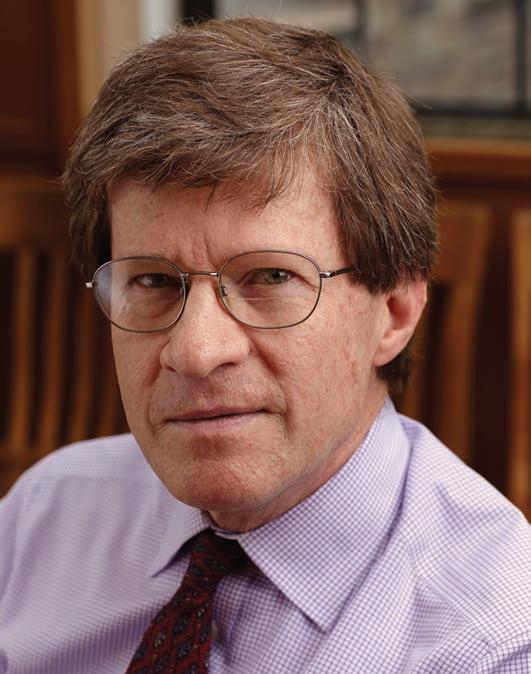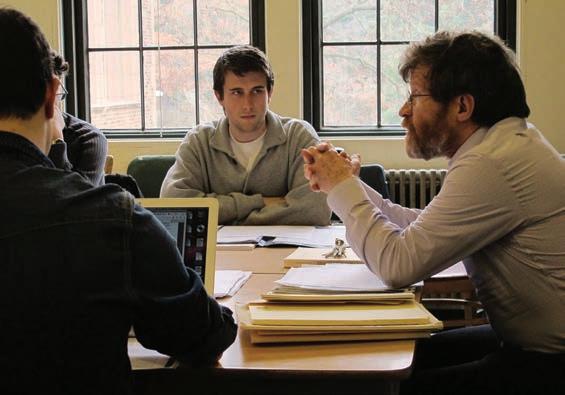
5 minute read
Exit Interview: Jonathan Bernard
MUSIC THEORY
Music Theory Professor Jonathan Bernard stepped down from UW teaching in June 2022 after 35 years on the School of Music faculty (Photo: Steve Korn) .
Advertisement
Music Theory Professor Jonathan Bernard retired in June 2022 after 35 years on the UW School of Music Faculty. In this email interview with School of Music publicist Joanne DePue, conducted in early June of 2022, Professor Bernard reflects on a fulfilling and challenging career and looks ahead to a full schedule of post-retirement activity.
SOM: What is the first thing you look forward to doing once you are retired?
JB: My course is set for the first month or so, with a symposium cooked up by two of my former students to help usher me out, followed a few weeks later by my daughter’s wedding, followed immediately after that by a conference in Venice on “New Concepts in Harmony, 1945–1975,” part of a multi-year project that has been stalled for the past couple of years by the pandemic but is now under way again.
SOM: What are some of your proudest UW accomplishments as faculty member/chair in Music Theory?
JB: I’m proud of the graduate program that John Rahn and I managed to build, first as a faculty of two, then of three when Áine Heneghan joined us for several years. I’ve missed them both for nearly a decade now; and since they were never replaced, owing to pressures to downsize the School of Music faculty (and for other reasons that I needn’t go into here), things have never been quite the same since. But I’m proud, too, of the excellent theory students who have earned master’s and doctoral degrees here, and who have gone on to doctoral programs at other good schools or to teaching careers and scholarly achievements of their own. We had a pretty good “shop” here for a while!
SOM: What advice you would give to a new School of Music faculty member?
JB: Advocate for what you believe the mission of the School should be, and stick up for your own program; but remember that your best chances of getting something done lie in making common cause with like-minded colleagues, making an effort to coordinate your program with those being offered by others in the School. As a faculty member in Theory, I had a little success doing that with my counterparts in Composition and in Music History, though probably not enough. I could have tried harder, and in retrospect feel some regret about that.
SOM: What is something you will miss about the School of Music when you retire?
JB: I’m showing my age in saying this, I realize, but it’s what I already miss that weighs most heavily on my mind: the sense of camaraderie, of common purpose, that I found (or thought I had found) among my colleagues when I first arrived in Seattle, in 1987. The intervening years have taken their toll; I especially lament the destructive polarization that has taken hold over the past decade. The current leadership has much damage to repair, and I wish them the best—as, of course, I wish all my soon-to-be-former colleagues, whom I will miss running into on a daily basis. They will, I hope, all lend a hand in rebuilding unity.
SOM: What music are you listening to these days in your down time (if any)?
JB: It’s never really “down time” when I’m listening to music, because one has to pay close attention no matter what it is. Whether it’s Elliott Carter’s Penthode, or Toru Takemitsu’s solo piano music, or Walter Piston’s symphonies, or recent albums by David Sanford and Tyshawn
Sorey, or some of Bill Frisell’s past vast discography—to list a more or less random sampling of stuff that’s been in my CD player lately. To paraphrase Yogi Berra: You can hear a lot just by listening!
SOM: What are you reading? What do you plan to read next?
JB: Currently in progress (partial list): Pierre Boulez, Music Lessons; Galileo, Dialogue Concerning the Two Chief World Systems (the book that got him into all that trouble); Graham Greene, Stamboul Train; Saul Bellow, Collected Stories. Once I finish these, it will be time to choose a Summer Classic for 2022, something I’ve done for the last 25 years or so—working away at my literary bucket list. Many attractive possibilities beckon; one leading candidate is Francis Parkman’s France & England in North America, which chronicles Europeans’ early explorations of our continent.
SOM: You’re stranded on a desert island and have with you just one piece of music or one album. What would it be?
JB: Horse Sings from Cloud, by Pauline Oliveros. This piece, on infinite repeat, ought to be ideal for inducing a suitable state of serenity until I either expire or am rescued.
SOM: What is something about you that might surprise people who don’t know you well?
JB: That I’m not much of a specialist, in the usual musicological sense. Not to make a virtue of necessity: I just get bored by doing the same thing for too long. My list of publications no doubt reflects this.
What is something a UW faculty member said or did that you will never forget?
JB: On the occasion of his retirement in 1994, Jim Beale reminisced about his early years on the School of Music faculty, way back in the late 1940s I believe, when one by one his senior colleagues were reaching retirement age and departing the scene. Jim said, “I couldn’t imagine ever getting that old myself. But now here I am, and let me tell you, it will happen to you too, in the fullness of time.”

First Book Manuscript Award for Frederick Reece, Music History
School of Music faculty member Frederick Reece received a First Book Manuscript Award as part of his recruitment to the University of Washington as an assistant professor in the Music History program.
Reece’s permanent appointment became effective in Autumn 2021, and prior to that, he served a year as visiting lecturer in the program.
Reece completed his PhD at Harvard University with his dissertation, “Ringing False: Music Analysis, Forgery, and the Technologies of Truth.” He has published on the issue of forged compositions in his article “Composing Authority in Six Forged ‘Haydn’ Sonatas,” in the Journal of Musicology.
His current research explores the works of canonical western composers such as Haydn, Mozart, and Schubert as emulated by musical forgers, from the eighteenth century to the present day. A book on the subject, titled Forgery in Musical Composition: Aesthetics, History, and the Canon, is under contract to Oxford University Press. The First Book Award, sponsored by the School of Music and the UW Simpson Center for the Humanities, brought two distinguished scholars to campus this past December for an in-depth discussion with Reece about his book manuscript. James Currie (University at Buffalo—SUNY) and Melanie Lowe (Vanderbilt University), the two visiting scholars, also presented a colloquium on forgery, identity, and authenticity in musical composition as part of the School of Music’s THEME lecture series.









